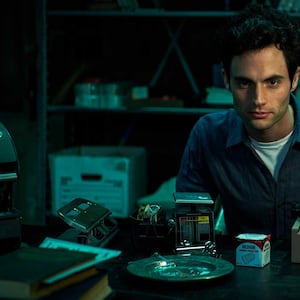Released on Dec. 26, Season 2 of Netflix’s serial killer melodrama You is somehow even more gruesome than its first season. While the first season of the series was oppressively grim, with its sociopathic protagonist’s violent misogyny thinly veiled as feminism and its terrifying testimonies to the collapse of privacy in the social media age, the latest installment goes all in on blood and guts.
In an early episode, one particularly grisly scene sees narrator Joe Goldberg (Penn Badgley) dismember the body of a victim and force the limbs through a meat grinder, juxtaposed with shots of his chef girlfriend chopping meat. Another murder scene in a later episode (disturbingly set in a playroom-themed sex dungeon where its owner abuses underage girls) is botched when an automatic Roomba vacuum cleaner begins splashing blood everywhere. Throats are slashed, a woman is buried alive in a shallow grave. Yet, a crucial change in location between the two seasons lends an element of satire that necessarily lightens the tone and sharpens the show’s self-awareness.
When You debuted on Netflix in December 2018 after being dropped by Lifetime, it was relatively unknown. Its move to the streaming platform and its bingeable potential quickly resulted in an enthusiastic following. Adapted by Greg Berlanti and Sera Gamble from Caroline Kepnes’ novel of the same name, Season 1 of You centered on Badgley’s Joe, a bookstore clerk in New York City seemingly torn straight from the pages of the “nice guy” handbook until his murderous stalker tendencies reveal themselves when he falls for Beck (Elizabeth Lail). The 10-episode season is deeply rooted in the East Coast literary scene, between Joe’s employment at the store, Beck’s writerly aspirations, and a character who is a descendant of J.D. Salinger.
Season 2, however, begins with Joe moving across the country to Los Angeles to flee the multiple murders he committed in his relentless pursuit of Beck, culminating with her own. In a testament to Joe’s sustained, deranged belief that he is ultimately a good guy and boyfriend at heart, he finally helps her become a famous author by compiling and publishing her writing posthumously.
L.A. provides an ideal escape when another ex-girlfriend Joe believed to be dead (because, duh, he was the one who tried to kill her) returns to the city with a promise to destroy him. Like plenty a twentysomething New Yorker with an inexplicably stalwart affection for vermin-polluted public transportation, Joe regards the West Coast with snobbish dread. No one would expect him to retreat to the land of veganism, vapidity, and vlogging. He even scoffs at Hollywood literary queen Joan Didion. “It’s the worst city in the world and the last place I wanna be,” he announces minutes into the premiere, “and that’s perfect.”
Gamble ironically piles on the L.A. stereotypes through shots of palm trees, an influencer livestreaming on the sidewalk, and girls posing for photos in front of a mural, all bathed in dreamy sunlight. The new object of Joe’s obsession, a woman literally named Love and played by a magnetic Victoria Pedretti, helps run her family’s sprawling health food store, Anavrin. (Get it? It’s “nirvana” spelled backwards.) Love and her friends prattle on about cupping and blood cleanses, and they go on wellness retreats dressed in flowing white prairie dresses, much to Joe’s scorn. These sequences reinforce Joe’s delusional superiority complex—his most powerful justification for committing heinous crimes.
The format will be familiar to fans of the show. Joe, who has adopted the alias Will Bettelheim and landed a job in the bookstore within Love’s shop, narrates his innermost thoughts in voiceover, which are often directly at odds with what is happening on screen. He speaks in the second person, directly addressing “You” (Beck in the first season and Love this time around).
Badgley is convincing both as the charmingly self-assured version of Joe, betrayed only by the fleeting darkness that occasionally overtakes his countenance, and the unraveling, rage-filled Joe who wakes up from a bad acid trip with bloodstained hands. The supporting cast is almost entirely new, with Carmela Zumbado as Delilah, a femme fatale journalist and Joe’s landlord, and Jenna Ortega as Delilah’s precocious teenage sister Ellie. James Scully plays Love’s codependent, kombucha-slugging twin brother, Forty. Ambyr Childers is back as Joe’s vengeful first girlfriend, Candace.
You has always succeeded at subverting genre expectations. In the first season, rather than an enchanting, unrealistic manic-pixie-dream-girl fantasy, Beck is almost numbingly uninteresting to everyone except Joe, who finds her blandness the perfect easel for his fanatical projection. Similarly, on paper, Joe appears to be the perfect boy-next-door type, and in fact he goes to great lengths to prove to himself that he is better than the other men in his life, like his neighbor who beats his wife in season one, or the pedophilic celebrity who tries to prey on Ellie in season two.
Of course, it is impossible to watch more than 20 minutes of any episode and believe that Joe acts out of goodness rather than a combination of psychopathy and misogyny. But it is still jarring as each scene exposes the sinister motivations behind the very qualities that make Joe seem like an attentive boyfriend, like when he offers to help Love’s troubled brother work on a screenplay. Love perceives this as a thoughtful gesture, but it is intended to distract Forty so he can’t interfere with Joe’s relationship. Even the phenomenon of serial-killer-as-sex-symbol à la Ted Bundy is a trope that You addressed offscreen, when fans began posting lusty tweets about Badgley’s character, prompting the actor to reply that he was uncomfortable with how his character was being romanticized.
As with Beck, Joe will stop at nothing until Love’s affections wholly belong to him. A jaw-dropping twist in the penultimate episode, however, proves Love to be a formidable counterpart teeming with her own darkness and ensuring that the show does not fall into a predictable cycle of boy-meets-girl, boy-terrorizes-and-murders-girl, repeat. Though it loses some of the gripping suspense of the first season, and the action-packed final episodes feel rushed compared to its lagging middle section, the second season of You is as addictively terrifying as ever.






